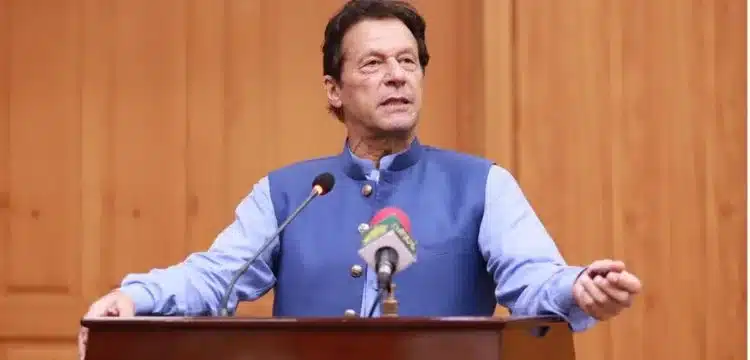[vc_row][vc_column][vc_column_text dp_text_size=”size-4″]In a virtual convention titled ‘Imran Khan and The World,’ Imran Khan, the founding chairman of Pakistan Tehreek-e-Insaf (PTI) and a former premier who was ousted from power, called on advocates of peace to join his cause. He urged them to denounce the ongoing erosion of democratic values and legal norms in the country. Speaking through an artificial intelligence-recorded voice, Imran Khan emphasized the necessity of a democratic government that operates within the confines of the rule of law and the Constitution to address internal and external challenges and tackle the prevailing economic crisis.
Imran Khan highlighted the repercussions of his removal from office, expressing concern over a series of crackdowns on PTI members and leaders, especially intensifying after a supposed “false flag operation” on May 9 the previous year. Facing over 200 legal cases and enduring more than 180 days of incarceration, he decried the unjust detention of female party activists, many of whom were mothers and housewives, characterizing the state’s assault on women as unprecedented in the nation’s history. Imran Khan alleged that, as part of a larger scheme devised in London, he and his party were strategically excluded from the electoral process.
Read more : Imran Khan Believes 90% Of The Military Families Will Support PTI
Facing setbacks, Imran Khan claimed a flawed judicial process resulted in the revocation of PTI’s electoral symbol, forcing its candidates to contest as independents under different symbols. He underscored the adverse impact of persistent political turmoil on Pakistan’s economy and diplomatic relations, reminiscing about his administration’s foreign policy based on regional economic connectivity.
Imran Khan highlighted his government’s vigorous efforts to engage with the Commonwealth of Independent States (CIS) states, Russia, and a renewed alliance with China. He also pointed out facilitative measures to foster closer ties between Iran, Yemen, and Saudi Arabia. Imran Khan, starting his address with condemnation of Israel’s assault on Gaza, labeled it as the genocide of the Palestinian people. He cautioned against escalating international crises, citing disturbances in maritime waters and the ongoing conflict in Ukraine.
Reflecting on Pakistan’s internal strife, Imran Khan accused the state machinery of bending the law and Constitution to thwart his political participation, attributing this course of action to the discontent of powerful circles with his pursuit of an independent foreign policy. Recalling losses incurred in Pakistan’s collaboration with the US’s “war on terror,” he reiterated his commitment to not serve as a proxy for wars and emphasized the importance of a principled stance against Islamophobia.
Addressing the significance of Kashmir in Pakistan’s foreign policy, Imran Khan claimed that his government took a resolute stance despite external pressures. He added that the withdrawal of Pakistan’s ambassador to New Delhi sent a clear message that normal ties with India depended on the peaceful resolution of the Kashmir dispute.
The convention featured contributions from political, constitutional, and academic experts, including Sami Hamdi, Turgey Evren, Dr. Moben Shah, Prof. Khaled Beydoun, and Ryan Grim. The majority of speakers concurred that, despite Western countries talking extensively about human rights and freedom of expression, their true motives were centered around gaining power in states worldwide.[/vc_column_text][/vc_column][/vc_row]











